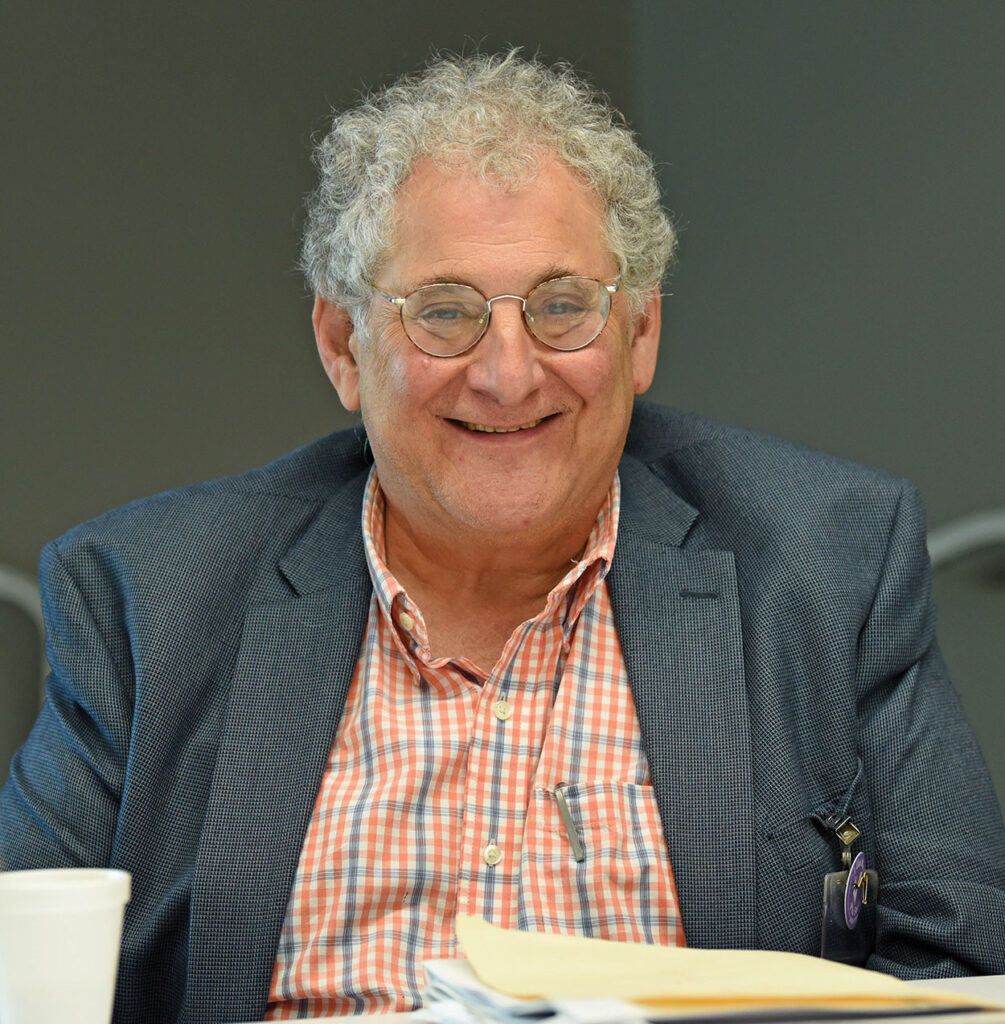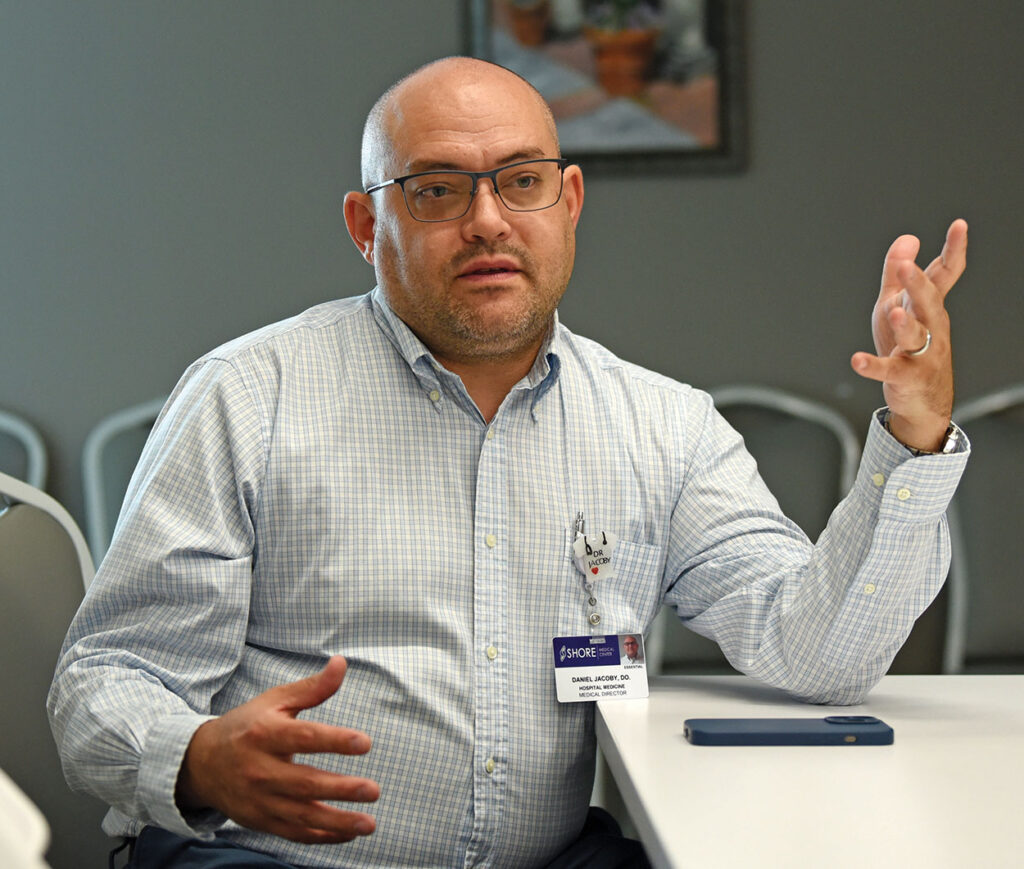SOMERS POINT — Teaching future doctors raises the level of care at Shore Medical Center because it invigorates the staff and benefits the patients as well as the medical students.
The experience may serve to entice these students back to the area to practice medicine after they graduate, an important aspect as physician shortages are expected to worsen in the coming decades.
Last year Shore Medical Center became a training ground for third-year medical students from the Philadelphia College of Osteopathic Medicine (PCOM) and earlier this summer began teaching its second class.
According to the physicians in charge of the program, Dr. Leonard Galler and Dr. Daniel Jacoby, who are the surgical and medical advisers of the PCOM program, respectively, the relationship benefits the college and the students as well as Shore Medical Center.
The medical students work with Chris Wodazak, core clinical campus coordinator for the PCOM students through her role with Shore Quality Partners, a network of independent physicians, employed physicians at Shore Physicians Group and Shore Medical Center.
“First of all, I don’t know if you ever had to be a patient, but it’s scary,” Galler said. Having medical students directly benefits patients by having “another compassionate person who comes in who is concerned about them. Right there, that’s a big plus.

“Number two, they’re part of a team, and through speaking and knowledge, and asking and answering questions, it raises everyone’s knowledge, including the patient’s. They act an an intermediary, they act as an adviser. It’s an enormous responsibility that they have as they learn,” Galler said.
The first two years of medical school is bookwork, he explained, and the last two years are internships. “It’s by seeing and doing. … (Students) will be allowed to start in the areas training of her field, doing procedures. She’ll be in the O.R., she will be involved with retracting, she’ll be up in close learning in that area. Each of the fields has that,” Galler said. “Each one of these things reminds us of the importance of what they’re doing. One of the problems with medicine is that it’s become directed by dollars and costs is that we forget the value of what we’re doing.
“And we have to be reminded,” the doctor said, and the students remind them every day “why we’re here. It’s not that I want to make money or get an extra case on, it’s that I want that human being to have a better opportunity to be better.”
Another strategic objective of having medical students is to help bring doctors to the community in the future.

“How do we retain doctors who come from here and go elsewhere? So having a program here, with (medical students) seeing our quality is high, our standards are high, our doctors are reasonable, our community is needy, will help us accrue more doctors in the future,” Galler said.
“One of the main reasons that we wanted to engage in this partnership is the future of medicine and the service that we have to our communities,” Jacoby said. “There is a mounting and widening physician gap in the country, to the order of hundreds of thousands of physicians shortage during the next decades. We’re down here in south Jersey.” This area isn’t an industrial Mecca and it is in competition with surrounding cities, including Philadelphia and New York.
“The realities of life is that many physicians have spouses who are also in high-level careers that require them to be near cities for employment, so we basically want to advertise this community, this medical center, to upcoming physicians, to say this is an alternative place to practice,” Jacoby said. “You don’t have to be in the hustle and bustle of the city with all the loud noises and things like that.”
The program also serves to highlight “that we have this really robust medical center here. We’re really proud of what Shore does for this community being an independent, non-profit, non-system-affiliated hospital, which is very, very rare in medicine nowadays,” he said.
“Most hospitals like Shore are either overtaken, as you’ve seen with Cape (Regional) and Cooper (University Health Systems), or they’re merged into larger systems,” Jacoby explained. “Shore presents a really unique practice opportunity for physicians. That’s what I see as the director of the hospital program. Our hospitalists joined here because they don’t want to be part of a big bureaucratic monster of a machine where you’re one of thousands of doctors on the medical staff and no one knows each other. This is definitely a small, hometown community type of setting.”
Ultimately, he added, “What we wanted to do was bring future physicians into the area to see what this community has to offer, both on a personal level to settle your roots and raise your family, but also from a professional medical level the kind of doctors and services you could be interacting with here.”
The students, Jacoby said, also “elevate the culture of the medical center. They ask questions. Their presence is inquisitive and it also shows our community we’re being innovative, that we’re participating in the future of medicine, we’re planning to make sure that we have the resources available for the community when these physician shortages arise.”
“We’re delighted to have the students here. They’re a great presence,” Jacoby said. “They add energy into the day-to-day mundaneness of medicine sometimes, so it’s always great. They bring a lot to us, too.”
Just having medical students at Shore this year and last year has raised “the caliber and quality and excellence of our institution,” Galler said. “When we have a student, we think more. We ask questions. We talk out loud. The patients see that. They get more attention. There you have a (student) just by being here has raised us so many notches higher in our excellence.”
There are benefits to the doctors. Each one who participates gets an academic title at the Philadelphia College of Osteopathic Medicine, providing an academic flavor to the physicians’ careers, and they get access to PCOM’s resources and archives. It helps fulfill doctors’ continuing education credits.
There is a more personal benefit as well. The interaction with students helps stimulate their own thinking and reminds them that much of what physicians do is remarkable.
“I will tell you as a surgeon, you go into an O.R. routinely and do things that you forgot are amazing and everyone in the room just accepts it,” Galler said. (He has been a general and vascular surgeon for 42 years.)
“You walk out and think no one can appreciate that what I just did was magic, yet a student in there, you look at their face (and see awe). And you realize, wow, we are doing something amazing. We’re doing something very, very important. And so it reinvigorates the importance of what we’re doing,” Galler said.
Shore’s benefit to med
students and training
physician assistants
Shore Medical Center has two physician assistant (P.A.) students as well as the 10 medical students this year.
“Right now we have our second round of third-year medical students. We have a couple of fourth-year students coming back to do electives here,” Galler said. “We have the two P.A. students. We are planning on expanding the numbers and we are seriously thinking about bringing in a first-level of a residency program.”
He noted that would be in combination with PCOM or independent and coordinated with PCOM in either family medicine or hospitalist medicine or perhaps general surgery.
That will take more work from Shore Medical Center’s side with all the necessary accredited bodies to get official status.
Galler believes Shore is a good fit for medical students because “community hospitals are doing 75 percent of the bulk of the work in this country.” It is also because students get such close contact with the physicians and in so many different areas because everything is essentially under one roof.
Students, he said, “have close contact with our (attending physicians) and our nursing staff and they’re getting contact you usually don’t see unless you have a higher level of residency. That’s a big advantage. Community hospital experiences is where medicine is all about.”
– STORY and PHOTOS by DAVID NAHAN/Sentinel staff

